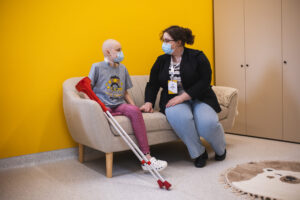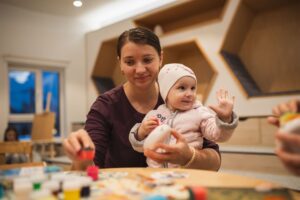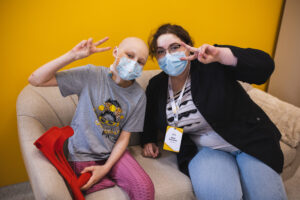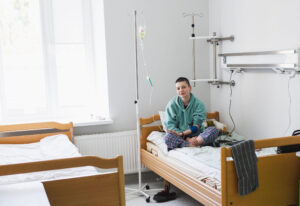
Talking to your child about the disease
How to talk to a child about an illness?

You may not know what to do, but remember - you are not alone. Doctors are always ready to help. If you find it difficult to tell your child about the diagnosis, seek support from specialists.
When talking to your child about cancer, keep in mind three principles:
- Be honest and open;
- Use simple words that the child understands;
- provide age-appropriate information.
A child needs to know that he or she is loved and supported. Honesty and openness build trust. Even if you want to hide the diagnosis, children still notice changes and may hear the word "cancer" from other sources. It is better to explain everything yourself to relieve tension. If the child does not understand, he or she may come up with more frightening versions and even blame themselves.
Plan the conversation:
- Say what you're going to say and how you're going to say it;
- seek the advice of medical professionals or other parents;
- stay calm and explain your emotions if you are crying;
- convince the child that the disease is not his or her fault.
Decide who will tell your child about the diagnosis and when. Doctors can help with the conversation or be present. It is important to say this as early as possible for trust. You can involve loved ones or professionals.
How to explain what cancer is:
- provide age-appropriate information;
- start with the basics and don't overload;
- pause so that the child can ask questions;
- explain in simple terms the terms the child will hear;
- support the child, encourage them to talk about their feelings;
- Correct misconceptions that may have come from the outside;
- Find out what the child already knows and add what is needed;
- Talk about hope - there are many treatments available.
How to talk about illness with a child under 6 years old

A child of this age does not yet fully understand what is happening. Explain that nothing bad will happen to him/her, it is not a punishment, and he/she is not to blame. Surround the child with love, care and attention.
It is difficult for children to be separated from their parents, especially their mothers. Therefore, visit your child in the hospital more often, take your favorite things with you, and create a homey feel.
To keep your child from crying and in a good mood, play with him or her, distract them with toys and interesting objects, and praise them for their good behavior.
How to talk about illness with a child from 7 to 12 years old

Children of this age can already take information seriously. Explain to them the causes of the disease and the importance of treatment, as well as the need to follow the advice of doctors.
Answer questions honestly and carefully so that the child understands why he or she is in the hospital. Find out what physical activities are allowed.
Facilitate communication with friends and family, support your child, and help them maintain a positive attitude.
How to talk about illness with a child over 13

During adolescence, a child may feel acutely different from his or her peers. Returning to school can cause stress and depression. It is important to provide psychological support, be open and respectful of personal space.
The teenager can participate in conversations about the disease. Keep a positive attitude.
Questions a child may ask
Children trust their parents and expect answers from them. Some ask right away, some ask later. Here are examples of important questions and how to answer them:
"Why me?"
Children may think that illness is a punishment. Explain honestly: no one knows why this happened. It is not because of his or her actions, and the disease is not transmitted to others.
"Will I feel better?"
It is a serious disease, but it is treatable. Doctors and family members will do everything to help you recover. This will give the child hope and confidence.
"What will happen to me?"
Explain the treatment plan and possible side effects. Tell them that changes in appearance are not necessary and help them prepare - for example, create a treatment calendar.
"Why do I have to take medication if I feel fine?"
Even if there are no symptoms, "bad cells" may remain in the body. The medicine must be taken to destroy them completely.
"What will I tell my friends?"
Support your child in communicating with friends and teachers. Explain that not everyone understands cancer and may not tell the truth. Encourage sharing of concerns. Emphasize:
- The disease does not change her as a person,
- The ignorance of others is not her problem,
- true friends will stay close.
"Will I be able to do what I used to do?"
The answer depends on the treatment. Explain what the restrictions will be and for how long. Offer alternatives for your favorite activities.
Support your child

Just like you, your child may feel insecure, anxious, and afraid, but often cannot express them in words. You, the parent, are the one who knows your child's usual behavior best and will be the first to notice any changes.
Help your child express his or her feelings through play, drawing, talking to animals, or playing with medical instruments. These are safe ways to help them talk about their fears and anxieties without words.
Conversations. - as a basis for trust
Parents are the first people a child can confide in about their fears and worries. Listen when the child speaks or starts a conversation. Ask questions: "What are you worried about?", "What are you thinking about?" Don't avoid difficult topics - sincerity gives you a sense of security.
Humor - as a resource of resilience
A positive attitude of parents is a strong support for a child. Laugh together, watch comedies, read funny stories, and remember fun moments. Even if you are having a hard time, try to find something bright in your day. Humor is one of the best ways to fight stress and fear. Remember: a smile does not mean levity. It is a way of saying: "We are together. We will make it."
Hugs for emotional comfort
Physical contact is very important, especially when a child is sick.
Young children need a lot of touch: hugs, cradling, stroking. Teenagers may react differently - ask if they need it, or watch their reactions. Even a short touch or a warm hand on the shoulder can mean a lot. Don't be afraid to touch your child through medical devices - catheters, IVs, etc. should not be an obstacle to intimacy.
Parental detachment, even if it is accidental, can be perceived by a child as a sign: "I am not like that", "I am less loved". And this is unnecessary pain.
If a child begins to do worse in school, changes eating habits, or reverts to early childhood behaviors, such as sucking his or her finger or having nighttime urinary incontinence, it is a signal that he or she is having difficulty coping with emotions. In such cases, be sure to consult a pediatrician, psychologist, or doctor.
Remember: You develop a special "sixth sense" - an intuition about your child's condition. If something worries you, don't ignore it. Specialists will help you overcome difficulties and support your child.
How to psychologically prepare a child for the procedures?

Regardless of whether the child is going to undergo chemotherapy or radiation therapy, surgery is a big challenge for the whole family. The task of adults is not only to explain what is happening, but also to help the child feel safe.
- Speak honestly and simply
Children ask a lot of questions. It's important to answer them sincerely, but in an age-appropriate way. There is no need to overload with details, but you should avoid deception. If you don't know something, say that you will find out together with the doctor. It is important for the child to feel that he or she is trusted, not deceived, and has the right to know what is going to happen to him or her.
- Call a spade a spade
Explain that treatment is not a punishment, but a way to help them get better. Say: "These medicines may hurt, but the doctors know how to help you", "Surgery is needed to remove the bad cells".
- Prepare your child for possible changes
Explain that some procedures may cause fatigue, nausea, changes in appearance (hair loss), discomfort or pain, but all of this is temporary.
- Explore fear together
Invite your child to express his or her feelings through words, drawings, and play. Play "hospital" or "surgery" together: treat a toy, show how the equipment works. This helps to "lose" the fear and make the situation more familiar.
- Create predictability
The more the child knows what to expect, the less anxious he or she will be. If possible, show them the place where the treatment will take place and introduce them to the medical staff. Create a small ritual of support after the procedures, such as cocoa, a favorite song, a hug, or a cartoon.
- Don't gloss over the difficult
Even the youngest can sense when something is wrong. If you don't talk frankly with your child, they may start blaming themselves or fantasizing even more frightening versions. It is better to explain in simple words: "Your body is sick, and we all - you, me, the doctors - will fight together for your recovery."
Teenagers: how to adapt to change?

While young children are most afraid of injections and procedures, teenagers are concerned about changes in appearance, hair loss, restrictions in life and communication with their peers.
For kids, the most important thing is the love and support of their families, and for teenagers, the opportunity to maintain independence and be part of their circle.
Therefore, support for adolescents should go beyond the family. It is important to help them:
- stay in touch with friends,
- maintain habitual interests (music, games, studying, social networks),
- maintain a sense of control by allowing you to make your own decisions,
- create a space where they can be themselves, even in the hospital.
Teenagers want to be strong, but they really need to be understood Love, attention and understanding - is the best support you can give her.
Our partners
